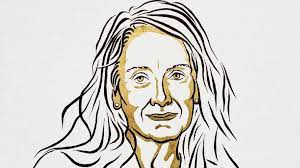
French novelist Annie Ernaux wins the 2022 Nobel Prize for Literature

The 2022 Nobel Prize for Literature has been awarded to French novelist and memoirist Annie Ernaux “for the courage and clinical acuity with which she uncovers the roots, estrangements and collective restraints of personal memory,” the Swedish Academy announced at a ceremony in Stockholm on Thursday. Ernaux, 82, is known mostly for autobiographical work, which establishes literature’s connection with sociology.
“Ernaux manifestly believes in the liberating force of writing. Her work is uncompromising and written in plain language, scraped clean. And when she with great courage and clinical acuity reveals the agony of the experience of class, describing shame, humiliation, jealousy or inability to see who you are, she has achieved something admirable and enduring,” Anders Olsson, Chairman of the Nobel Committee, said.
Ernaux was shortlisted for the International Booker Prize in 2019 for The Years (Fitzcarraldo Editions), “a personal narrative of the period 1941 to 2006 told through the lens of memory, impressions past and present—even projections into the future—photos, books, songs, radio, television and decades of advertising, headlines, contrasted with intimate conflicts and writing notes from six decades of diaries.” The Years, considered by many to be the iconic French memoirist’s defining work, was a breakout bestseller when it was published in France in 2008.
Arduous path to authorship
Born in 1940, Ernaux grew up in the small town of Yvetot in Normandy, where her parents had a combined grocery store and café. Her setting was poor but ambitious, with parents who had pulled themselves up from proletarian survival to a bourgeois life, where the memories of beaten earth floors never disappeared but where politics was seldom broached, Olsson said in a stamement. “In her writing, Ernaux consistently and from different angles, examines a life marked by strong disparities regarding gender, language and class. Her path to authorship was long and arduous.”
Despite her classic, distinctive style, Eranux declares that she is an “ethnologist of herself” rather than a writer of fiction. “She often refers to Marcel Proust’s À la recherche du temps perdu, but equally illuminating is that she has been deeply impressed by a sociologist like Pierre Bourdieu. The ambition to rip apart the veil of fiction has led Ernaux to a methodic reconstruction of the past but also to an attempt to write a ‘raw’ type of prose in the form of a diary, registering purely external events. We see this in books such as Journal du dehors (1993; Exteriors, 1996) or La vie extérieure 1993–1999 (2000; Things Seen, 2010),” Olsson said.
Also read: Salman Rushdie emerges as bookies’ favourite for Literature Nobel
Last year, the award was given to Tanzanian-born, UK-based writer Abdulrazak Gurnah. The Nobel prize announcements kicked off on Monday, with Swedish scientist Svante Paabo being declared the winner in medicine for his work on the Neanderthal DNA. Alain Aspect, John F. Clauser and Anton Zeilinger jointly won the physics prize on Tuesday for their immense contribution to quantum physics. In chemistry, the Nobel prize was awarded to Carolyn R. Bertozzi, K. Barry Sharpless, and Morten Meldal on Wednesday for developing click chemistry. The Nobel Peace Prize will be announced on Friday while the economics award on Monday. The prizes carry a cash award of 10 million Swedish kronor (nearly $900,000) and will be handed out on December 10.


